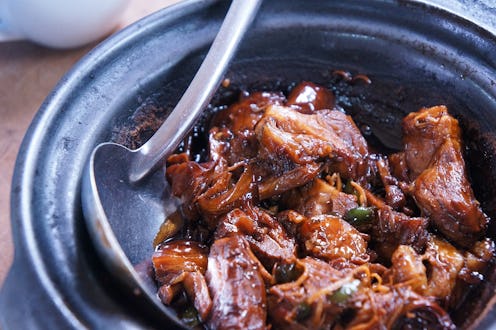Life
Things That Can Happen When You Stop Eating Meat
Sometimes you might find yourself craving a steak, and that's totally cool, but other times you might choose to go meat-less. Take it a step further and go meat-less for a week or more, and you might notice some odd changes in your body when you stop eating meat, without a smoother transition. Of course, if you you feel that not eating meat is best for your lifestyle and dietary needs, or even if you're simply looking to cut down your intake, it's worth sticking with you goals and letting your body adjust.
As a certified health coach, I work with clients on finding a way of eating that fits for their needs and can boost their health, leading to greater wellbeing and happiness. While some people might thrive off a diet high in animal protein, others might suffer (and some might fall somewhere in the middle). No matter where you land, any drastic change in cutting out a primary food group will shock the body and pose some unexpected changes. If you notice any weird symptoms during this transition, it might be worth checking with a physician to make sure you're ok. If you get the green light to continue, just know that these side effects are totally normal. Here are 9 things that can happen to your body if you suddenly stop eating meat for a week or more.
1. Initial Low Energy
"Initially you may have some meat cravings and low energy but your body will quickly adjust as long as you are eating balance meals and snacks," says Kristen Johnson Brogan, Chief Nutrition Officer at On Target Living, over email with Bustle. "As long as you are supplementing with high quality plant protein, like hemp seeds, nuts, leafy greens, and ancient grains and not giving up protein completely," you should be fine, says Brogan. In fact, you might gain newfound energy once your body adjusts, Brogan adds.
2. Anemia
Although this can be dangerous unless treated with supplementation and better food choices, you might develop anemia when cutting out meat products. "Symptoms of anemia include fatigue, weakness and dizziness. Because meat, eggs, poultry, fish and dairy products are the primary dietary sources for iron, non-meat-eaters need to make sure that they are getting enough [from other sources]," says celebrity trainer and found of the FitMatch app, Ngo Okafor, over email with Bustle.
3. B Vitamin Deficiency
"People who do not consume animal protein (meat) are usually deficient in many important nutrients, including Vitamin B12 and Creatine," explains Okafor, vitamin B12 is only found in animal sources. To remedy this, make sure to take a daily supplement for complex B's in order to avoid malnutrition.
4. Desensitized Taste Buds
According to nutrition experts at Healthline, research has found that you might lose your strong sense of taste when you have a zinc or vitamin B12 deficiency, which can often happen when you suddenly restrict meat intake. Zinc is critical for those taste buds, and plant proteins, like beans, legumes, and tofu, can interfere with absorption. To protect yourself, consider supplementation.
5. Low Testosterone
If your sex drive is plummeting or you're having trouble lifting as heavy as you're used to in workout classes after cutting out meat for a period of time, it could mean your testosterone levels are decreasing, explains Okafor. Likewise, Dr. Michael P. Muehlenbein explained to Livestrong that a real marker for reduced testosterone could just be inadequate protein, as it's harder to achieve on a vegan or vegetarian diet. As long as you're vigilant about intake, you shouldn't notice too much of a difference.
6. Better Bacteria In Your Gut
When you cut out meat, you increase better, beneficial bacteria in your gut, to improve digestion, long-term, and you lower the risk of foodborne illnesses and poisoning that is often associated with animal protein. You might notice your digestion feeling much more smooth and regular.
7. More Bloating & Gas
According to Liz Applegate, PhD, director of sports nutrition at the University of California, Davis over interview with Prevention, you might notice you're more gassy or bloated than usual after eliminating meat for a week or more and replacing it with more plant-based foods. While plants are super healthy, they can also bring on the gas (which is also perfectly normal).
8. Greater Need For Recovery Post-Workout
Over interview with Prevention, Emily Bailey, RD, director of nutrition coaching, sports nutrition, eating disorders, and weight management at NutriFormance in St. Louis explained that animal proteins are more readily absorbed and quick to start the repairing process, so if you eat plant proteins after working out, it might increase the time needed for muscles to recover (which they will, just with more effort).
9. More Alkaline Body State
Sally Warren, PhD, traditional naturopath at Metro Integrative Pharmacy, explained to Reader's Digest that by cutting out meat, which is a highly acidic food, you'll make your body more alkaline, where it'll thrive. Having a less acidic pH level helps improve sleep, skin, stress, and other aspects that can improve your wellbeing and help you achieve a greater balance, said Warren.
If you notice these symptoms after going on a meat-free diet for a while, know that they're expected. Give it some time if this new way of eating works for you, and see if the side effects go away as your body adjusts to the changes.
